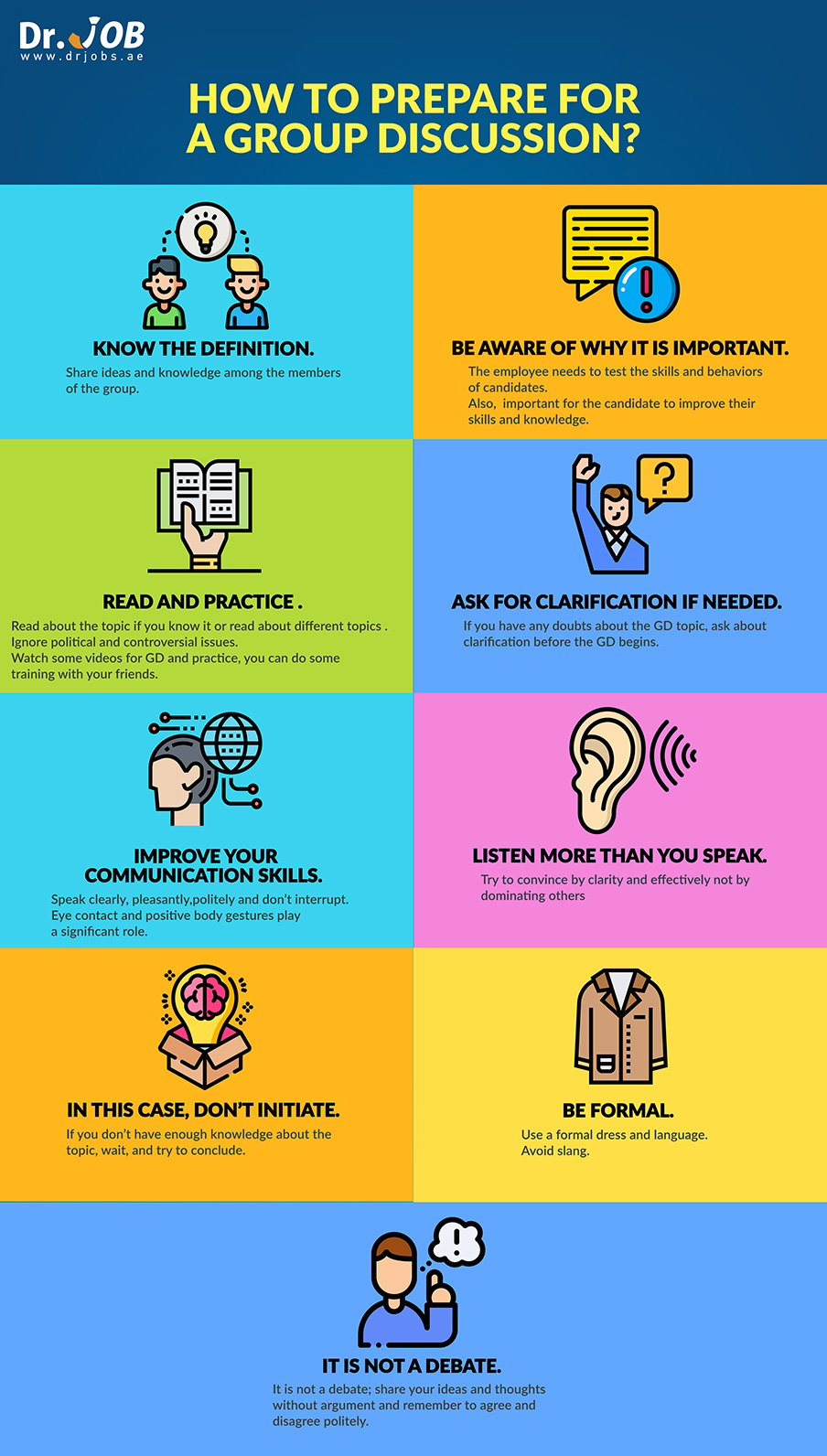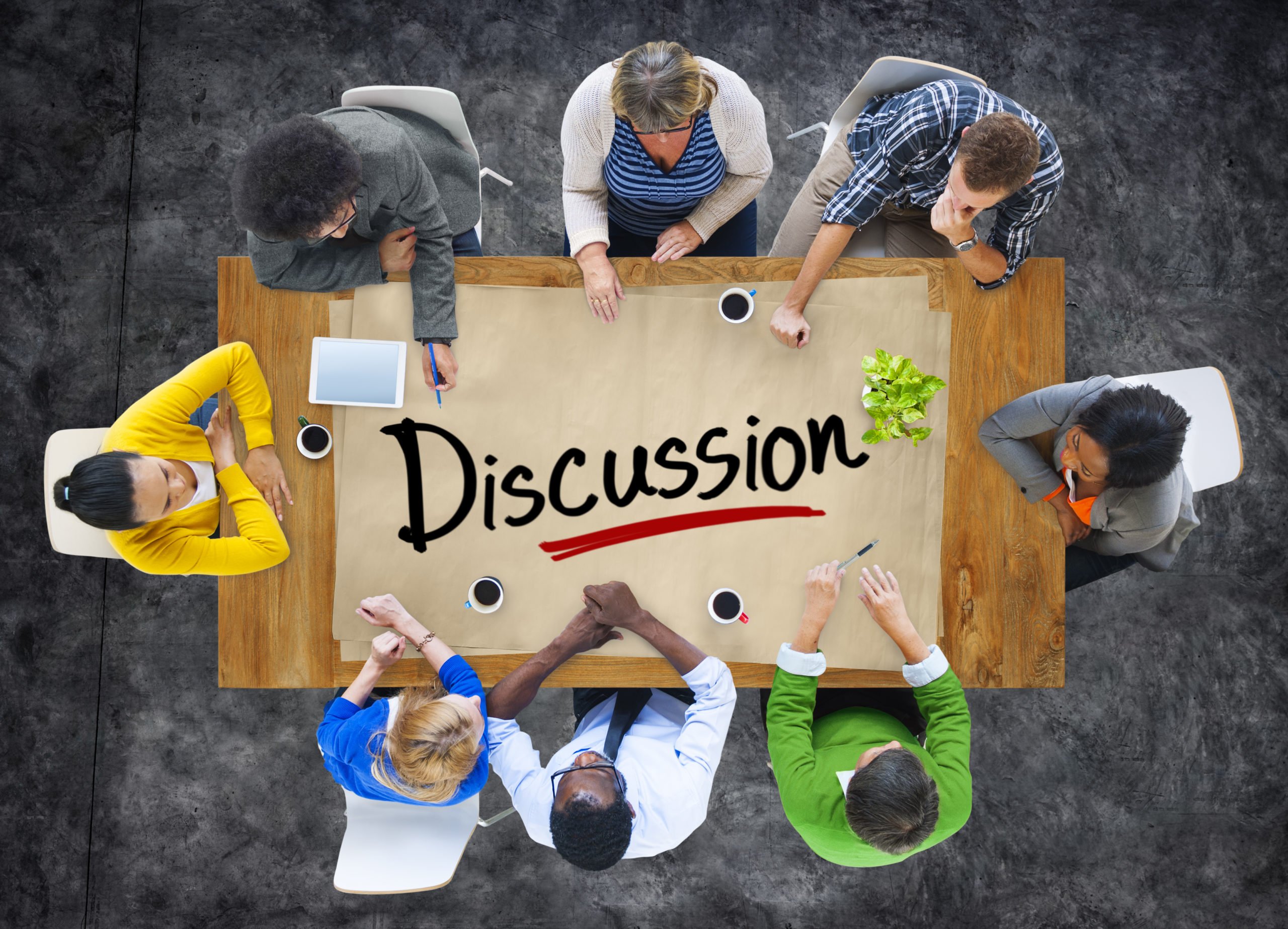What does Group Discussion mean?
A group discussion is commonly known as (GD).Group discussion is a share of ideas and knowledge among members of a group (from 8 to 15).
It is a methodology used by organizations for selecting personnel; in this methodology, candidates will be given a topic and few seconds to think about it and then asked to discuss the topic among themselves within 10 to 20 minutes and place their opinion on it.
What is the purpose of GD?
It gives the employer the chance to get an idea about candidates in a short time besides, asses their skills, behavior, and personality traits, which generally can not be evaluated in interviews.
If you are an employer, want to hire the right personnel, register, and post jobs for free on Drjob.
Examples of the basic skills required in GD:
- Communication skills
- Interpersonal skills
- Listening skills
- Tolerance
- Leadership skills
- Team-building skills
- Analytical /logical skills
- Confidence
“The first impression is the best “
- The employer needs to test the skills and behaviors of candidates. Also, body language and eye contact are essential points to be considered.
- Even if the candidate is perfect in the technical aspects, the candidate must be able to express his /her thoughts and ideas politely. Also, he/she has to be open to accommodate the viewpoints of the others.
- On the other hand, GD is useful for the candidates also, as it gives them the chance to read more to prepare and improve their skills and behavior.

1. Enhance your knowledge.
You should know about what is going around you in the world; you can take the help of newspapers and television to enhance your knowledge.
The GD topics can be about business, finance, sports, or any currents issues.
Controversial and political issues are usually not discussed in GD, so don’t waste your time on them.
If you know the topic in advance, do some searches about it.
If you are looking for a job in the business development sector, apply for a job and start improving your knowledge.
2. Practice
Watch some videos about group discussions and practice being a part of it; the mirror may help you as it will reflect your gesture and your way of speaking, or you can practice with your friends and learn from each other.
3. Focus on your communication skills.
Always try to improve your communication skills as you may have good content and ideas, but if you are not able to communicate, then all are useless.
The communication skills measured from dual views, verbal and non-verbal. Verbal skills like fluency and articulations, while non-verbal skills like body language and eye contact.
So, for verbal communication, you need to improve your vocabulary, and you can find below some expressions that may help you:
- (I think - I believe) are used when you would like to express your opinion.
- (Good morning, I would like to begin by saying that) at the beginning of the discussion.
- (That’s true, but- however-and with due respect, I would only partly agree to that) used when you disagree with what someone has said.
- (You made a good point, but I would also like to add) if you agree with someone and want to add another opinion.
- (Please let me finish) if someone tries to interrupt, but you want to finish your point, “hold the floor. “
- (I am sorry but could you please make it clearer) if you are going to ask for clarification.
- (Can we sum up by saying) an excellent way to end the discussion by including everyone in it.
On the other hand, your non-verbal communication, such as body language, eye contact, and posture, will be tested as well.
So, be confident, keep positive body language, and show interest in discussion, sit straight, avoid knocking the table, don’t stare at the floor, or the window.
Don’t try to dominate anyone and avoid nervous body movement.
If you think that you have strong communication skills and wish to work in public relations and social media field, visit Dr. Job and have a glance.
4. Listen more.
- Focus on what others have to say, pay your full attention.
- Give others a chance to speak as just speaking doesn’t make you better.
- Try to take the initiative or conclude at last in the group that will add points for you from the interviewer but don’t initiate all time, allow others to speak.
- If you don’t have enough knowledge about the topic of discussion, it is better not to initiate.
6.Be formal.
Attend the group discussion in a formal outfit. The language used should be formal, direct, and simple but not slang.
7. Share your thoughts.
It is teamwork; it will show how you connect with the team; it will also define your leadership skills when you take initiatives, listening to your team-mate, and avoiding interruption.
Remember! It is not a debating stage.
What is the difference between Group Discussion and debate?
The debate is to argue and persuade the other side that your view is correct, while group discussion is to share ideas for a better understanding of a topic, and it is less formal than debate.
In a nutshell, read more, be confident, improve your skills, and be an optimist.
Dr. job wishes you a fruitful group discussion!
For a dream career, click here.







 2024-10-23
2024-10-23
 2024-09-04
2024-09-04
 2024-08-27
2024-08-27
 2024-08-12
2024-08-12
 2023-04-26
2023-04-26